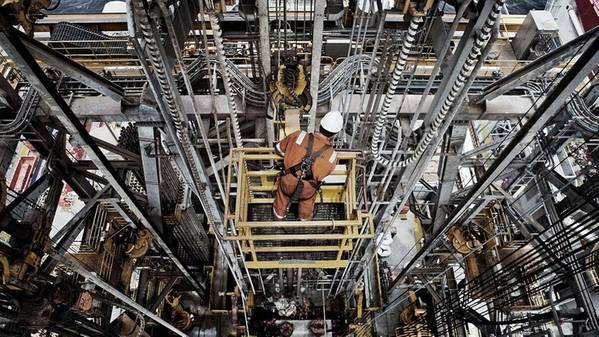
Danish offshore drilling company Maersk Drilling has joined a consortium whose aim is to develop an offshore storage solution for CO2 captured in Danish onshore facilities.
Maersk Drilling said Wednesday it was joining a new CO2 storage consortium formed by INEOS Oil & Gas Denmark and Wintershall Dea.
"The consortium is maturing one of the most progressed carbon capture and storage projects inside Danish jurisdiction and targets the development of CO2 storage capacity offshore Denmark based on reusing discontinued offshore oil and gas fields for permanent CO2 storage," the drilling company said. The aim is to develop offshore storage with the capacity to store approximately 3.5 million tons CO2 per year by 2030.
As part of its commitment to the consortium, Maersk Drilling has pledged to contribute know-how and limited funding to the initial phases of the project.
Ships to Carry CO2 to Offshore Storage
The project aims at building infrastructure and capabilities that will enable CO2 captured in onshore facilities to be transported offshore for injection and storage beneath the seabed. The first phase of the project will be a feasibility study to validate reservoir compatibility, followed by a pilot to test CO2 injection. The Geological Survey of Denmark and Greenland (GEUS) will act as a research partner to the project, conducting specialized laboratory experiments and results in analysis.
The project aims to store CO2 captured onshore 1700 meters beneath the seabed. For the onshore capture, proven carbon capture technology can be used at carbon-intensive facilities, for example, industrial plants or power plants, the company said.
The captured CO2 will be bunkered in ports and transported by ship to the offshore storage platform which will reuse existing infrastructure originally built for oil and gas production.
At the offshore platform, the CO2 will then be injected for permanent storage beneath the seabed using repurposed oil and gas wells. The consortium has set a goal of developing the capacity to store approximately 3.5 million tons CO2 per year by 2030. This puts the project in the range of delivering CO2 storage corresponding to 15-20% of the reduction required to reach Denmark’s reduction target in 2030.
First well in 2025
The target is to have the first well ready for injection from the Nini platform offshore Denmark in 2025.
Longer-term, the goal is to develop the capacity to store approximately 3.5 million tons CO2 per year by 2030, matching the Danish Climate Council’s recommendations of actions needed to meet Denmark’s 70% reduction target.
"Maersk Drilling expects that its offshore rigs will be used to repurpose the existing oil and gas wells for CO2 injection," the drilling company said.
CEO Jørn Madsen, Maersk Drilling:"We’re really excited to be joining this effort to support the green transition by using the facilities and capabilities of the offshore industry and Maersk Drilling’s more than 40 years of experience with drilling wells in the North Sea. As the Danish government recently stated in its climate plan, carbon capture and storage is an important component in the efforts needed to reach the goal of reducing Denmark’s emissions by 70% by 2030. For Maersk Drilling, the project is part of our innovation initiatives and an attractive opportunity for building additional competencies and broadening the use of our rigs."
"At Wintershall Dea we are very certain: the global energy transition is happening, and we intend to play a decisive role in it. One way we will do so is through technology and innovation projects like this. Offshore CO2 storage can have a significant contribution to a cleaner energy future and the potential to significantly mitigate CO2 emissions in Denmark,” says Hugo Dijkgraaf, Chief Technology Officer of Wintershall Dea. “Thus, we really appreciate the support of the Danish authorities to fund this important endeavor.”
In addition to taking part in the offshore carbon storage consortium, Maersk Drilling has reminded it is working to reduce the emissions associated with offshore drilling in multiple ways. This includes the first-ever rig to operate onshore power and the upgrade of two jack-ups to hybrid, low-emission rigs.



